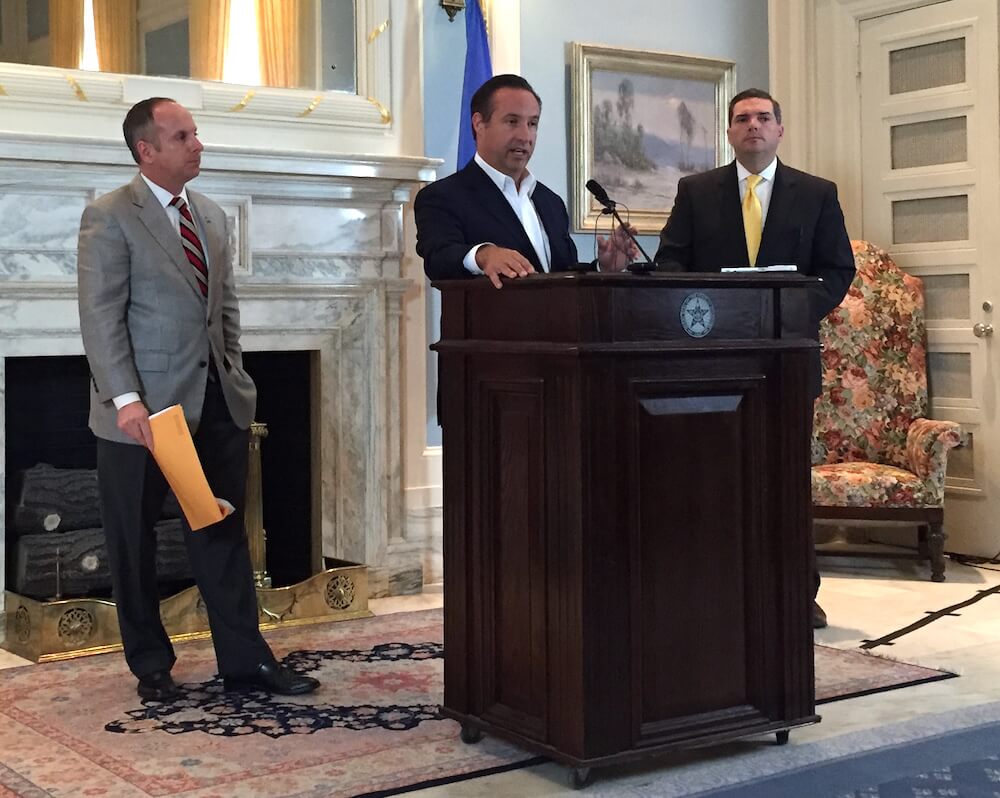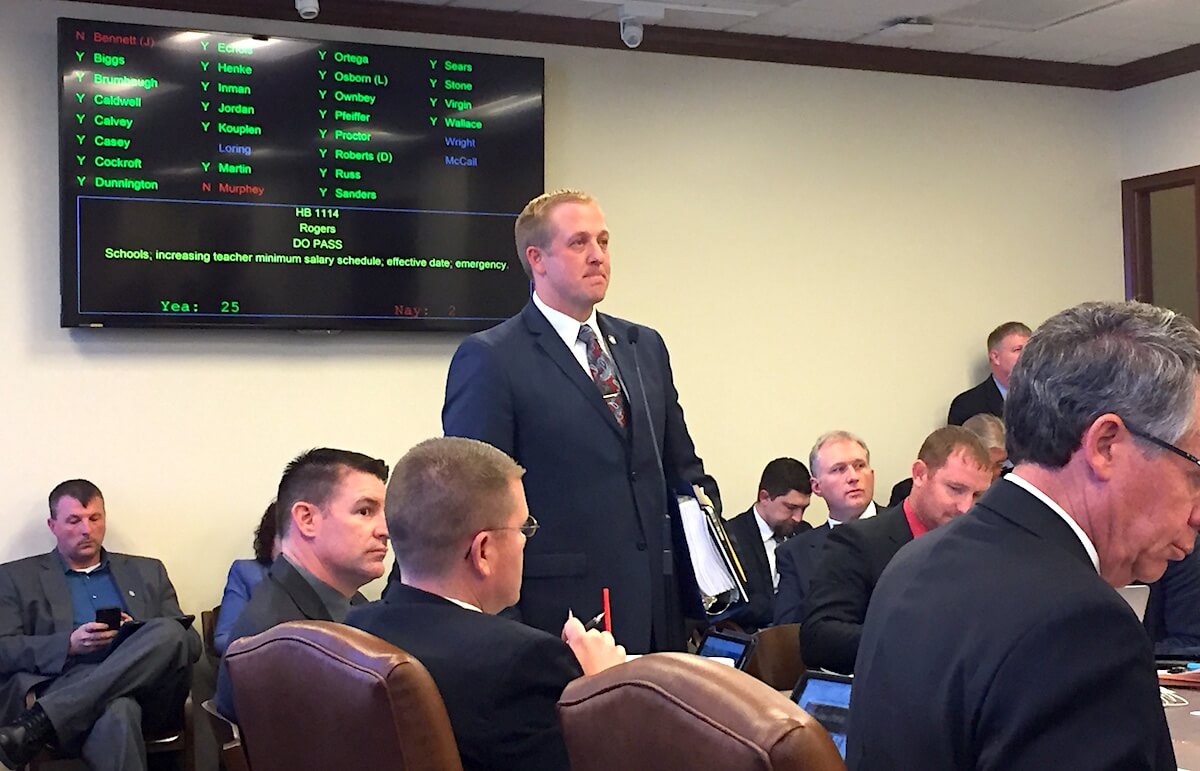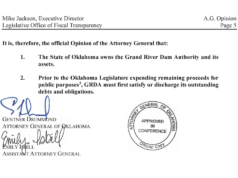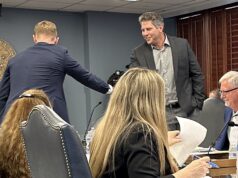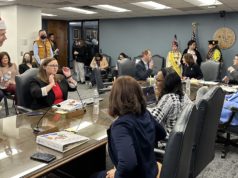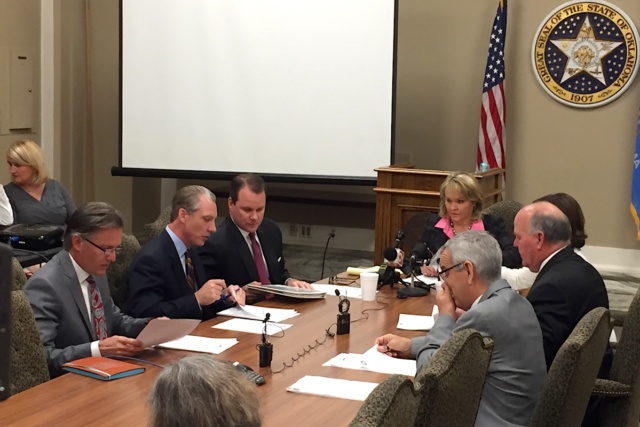

For the second time in two fiscal years, the state of Oklahoma has declared a revenue failure, meaning tax collections are below the estimates used to pass the state budget last session.
“Our revenues are difficult at best, and maybe they fall into the category of pathetic,” Secretary of Finance Preston Doerflinger told a packed room of elected officials, bureaucrats and media this morning. “Our situation is dire. I beg you to have an appreciation for the situation we have before us.”
Doerflinger’s somber announcement came at a regularly scheduled meeting of the Board of Equalization, which certifies the valuation of state property and tax estimates. He was speaking to Gov. Mary Fallin, Lt. Gov. Todd Lamb, Treasurer Ken Miller, Auditor Gary Jones, Superintendent of Public Instruction Joy Hofmeister, Secretary of Agriculture Jim Reese and new Attorney General Mike Hunter, who all sit on the board.
Doerflinger said collections have missed their mark to the point of declaring a 0.7 percent revenue failure, meaning state agencies will see an across-the-board reduction in funding beginning March 1. That will functionally total $34.6 million, Doerflinger said, including an $11.1 million reduction for the Oklahoma State Department of Education.
“We could likely see further reduction by the end of this fiscal year,” he said.
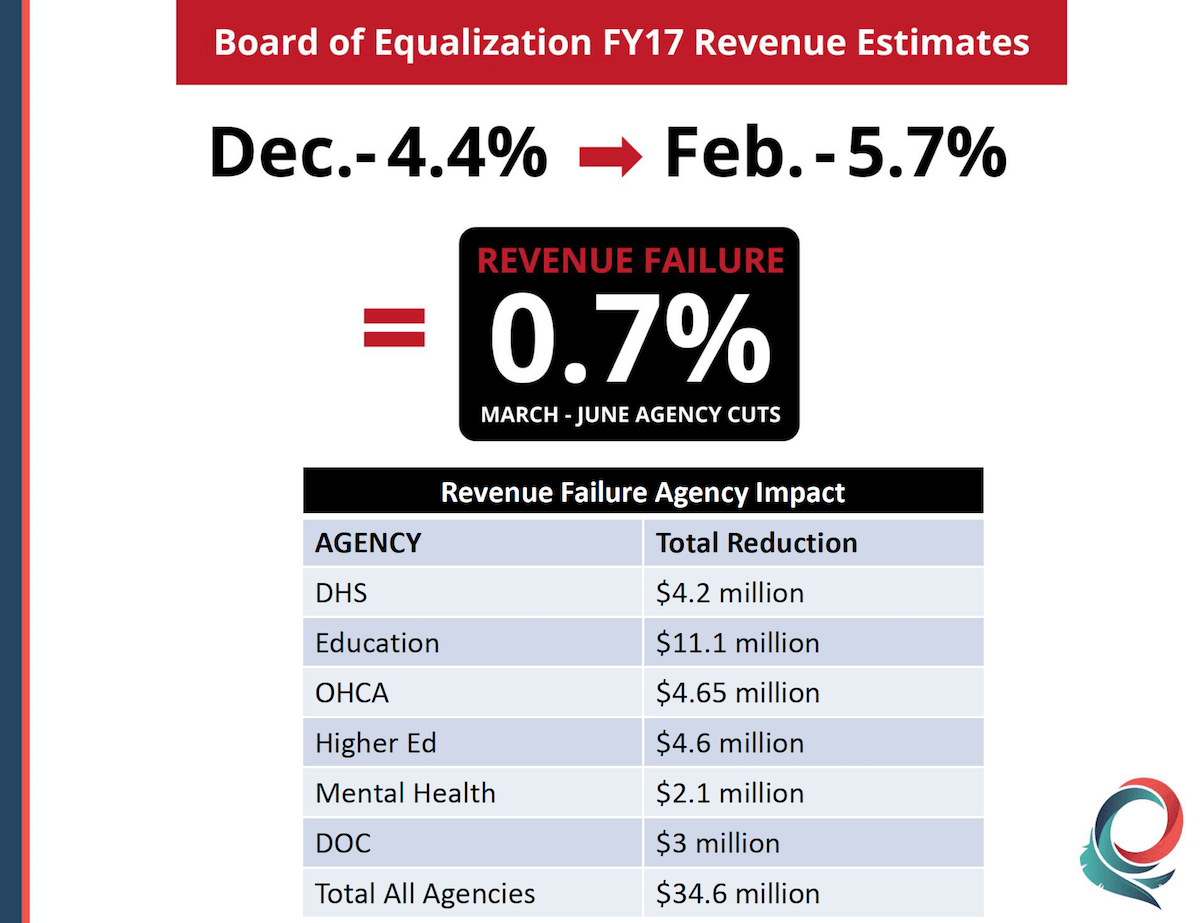
Hofmeister spoke carefully and solemnly about the effects of more mid-year cuts to education after Tuesday’s meeting.
“Any cuts that will be occurring are certainly happening mid-year where budgets are already set and contracts are already extended, so it makes it exceptionally difficult,” she said. “We’re aware that cuts at this point mean a loss of services for students.”
‘It’s not a game’
Doerflinger also alerted the board to an even larger budget hole for Fiscal Year 2018 than had been anticipated: $878 million, up from $868 million. He more than subtly urged the board — and legislators — to consider Fallin’s bold revenue ideas.
“I don’t know how much more I can emphasize that the time for action is now,” Doerflinger said. “It’s not a game. We need new revenues.”
Doerflinger spoke at a podium directly in front of Fallin and Lamb, who stepped down from Fallin’s cabinet last week because he said he could not support the governor’s proposal for sales tax to be implemented on a variety of services.
“The governor is a pragmatic person, a reasonable person,” Doerflinger said to a silent, crowded room. “She has put forward a bold proposal. I know she and I look forward to specific plans to be revealed by other people involved in this process.”
LAST SESSION:
Oklahoma revenue failure: ‘There you have it, folks’ by William W. Savage III
After the meeting, Fallin defended her revenue proposals and challenged Lamb, House Minority Leader Scott Inman (D-Del City) and anyone else within earshot to present their own ideas if they want to criticize hers.
“I’m perfectly aware that my budget is not a popular thing to do, but I had to find $868 million — at that time — of a shortfall to be able to fill the budget gap,” Fallin said. “In my executive budget, I tried to outline a reality check for the state of Oklahoma.
“We have to do something, and standing in the middle of the road doing nothing is not an option.”
Doing nothing, according to more than a dozen slides Doerflinger presented to the Board of Equalization, could mean various catastrophic scenarios for state agencies.
In one scenario, no new revenue combined with holding common education funding even could mean a 23 percent across-the-board cut to all other state agencies.
In another scenario with no new revenue, funding seven core agencies at a flat level from last year — Department of Education, Regents for Higher Education, Oklahoma Health Care Authority, Oklahoma Department of Mental Health and Substance Abuse Services, Department of Corrections, Department of Human Services and Department of Transportation — would result in $0 total for other state agencies, Doerflinger said.
“We’re not going to grow our way out of this problem,” he said.
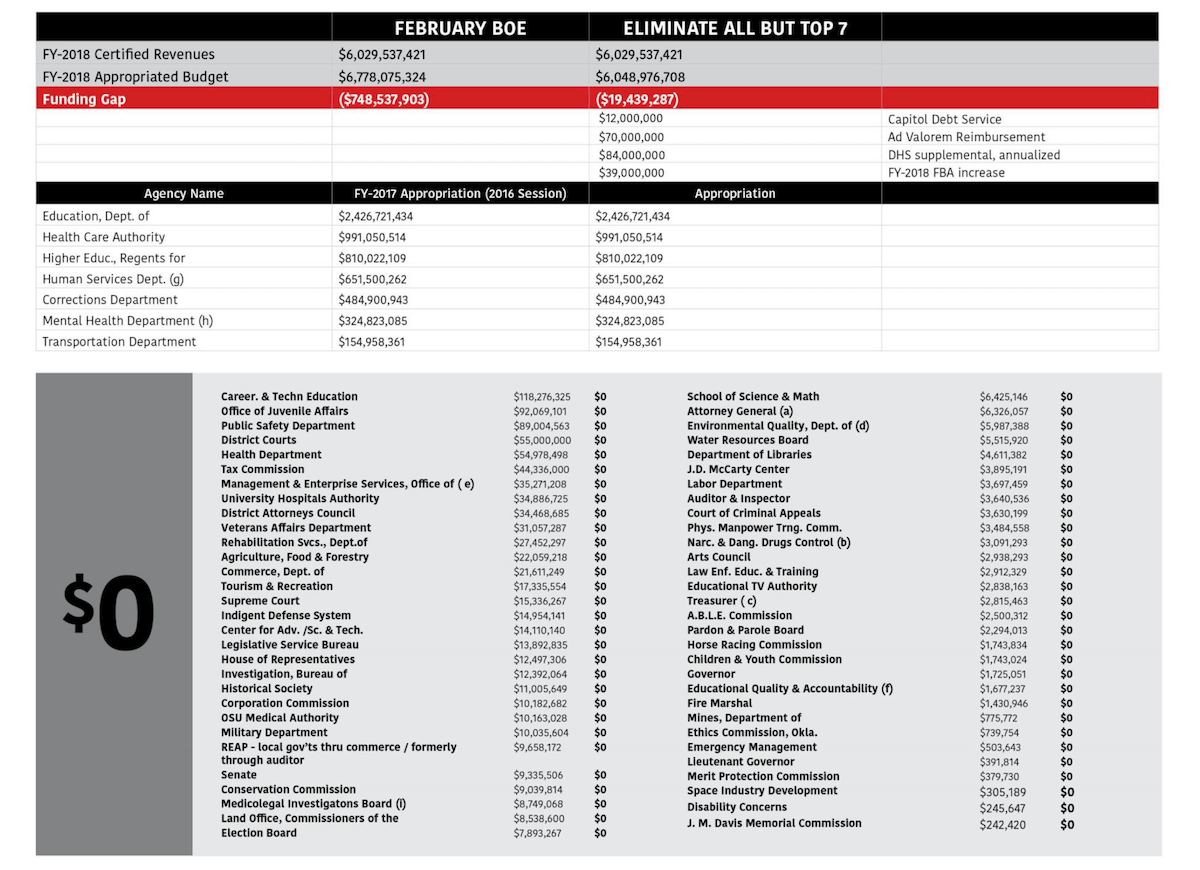
Cigarette tax up first
Of all of Fallin’s proposed revenue measures, the House is expected to take up HB 1841’s cigarette tax first, potentially as early as this week.
“If they don’t pass that, then I would assume that they won’t pass anything (for new revenue),” Fallin said. “That creates a big challenge. (…) We just have to decide as a state, what do we want to fund and what type of services do we want to have? We can deliver services, but they may not be good.”
Fallin rattled off a list of complaints about state services that her office already hears regularly, and she said it’s important for “everyone to come to the table with solutions and to help unify the party itself to work together.”
That comment came in response to a question about Lamb’s opposition to her sales tax plan.
“It’s certainly a very challenging time for everybody, whether you’re in the House or Senate or you’re governor or lieutenant governor,” Fallin said. “But to offer no solutions is not a solution. So I always welcome his ideas. I’m always happy to receive his budget. I asked him earlier in the year, ‘What ideas do you have?’ If he’s got a budget that he wants to propose, I’m happy to look at that, but I haven’t seen anything.”
Asked whether Lamb had offered her any budget ideas, Fallin said, “Not yet.”
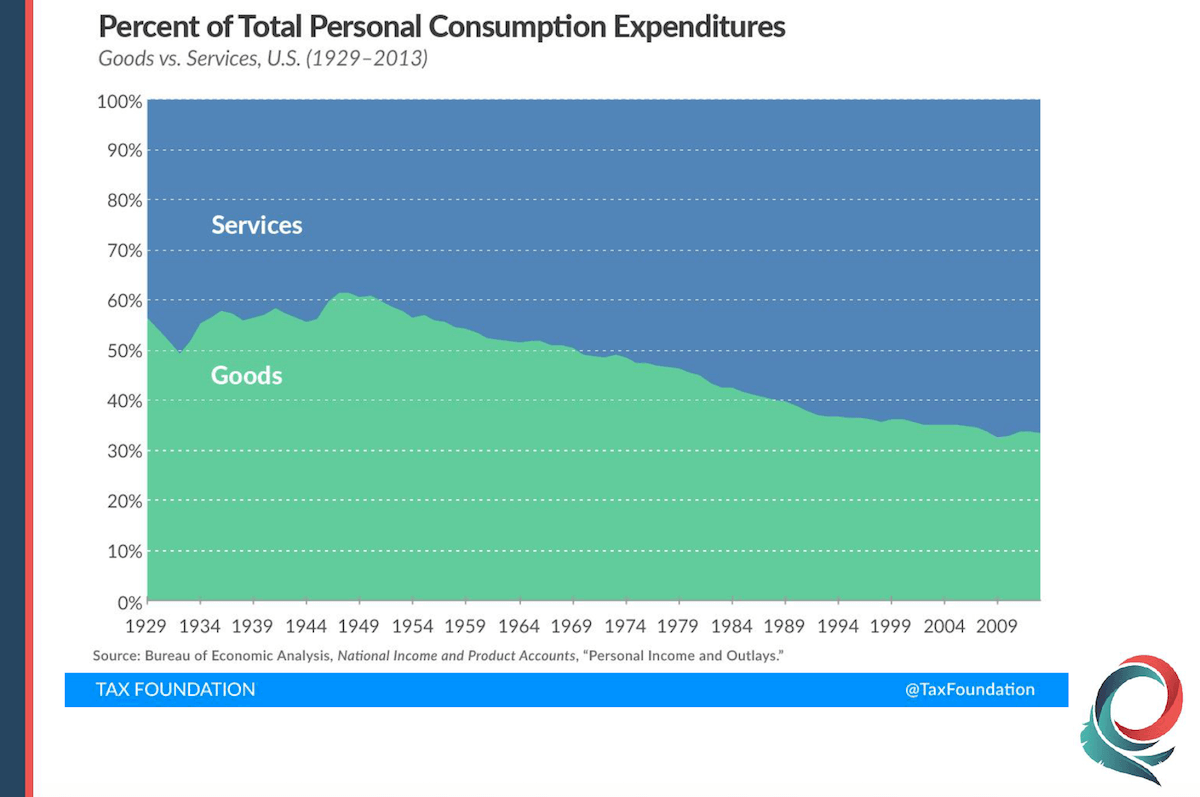
Different days, different narratives
Tuesday’s budget blues were announced less than 24 hours after the House Appropriations and Budget Committee passed bills that would increase the salaries of teachers and other state employees.
RELATED
Teacher pay raise heads to full House: ‘We can pass it’ by William W. Savage III
Members of both parties expressed concern about finding funding for those proposals, criticism that appeared more prescient after the state’s FY 2018 budget gap increased Tuesday.
Hofmeister expressed grave concern for the budget situation yet remained hopeful.
“We have confidence that there is a great desire to meet the needs of education,” Hofmeister said. “We know that this is complicated, and there is, I believe, a firm will and commitment in the Legislature, and we stand to see this worked through amid very difficult times.”
Fallin said the solution must be structural in nature and not just the “tricks” or “gimmicks” that Doerflinger said the Legislature has used in recent years.
“I’ve said for the last three years, including this year, that we have to fix our structural deficits in our budgets,” Fallin said. “We can’t keep moving money from one place to another and playing what I would call ‘smoke and mirrors.'”









